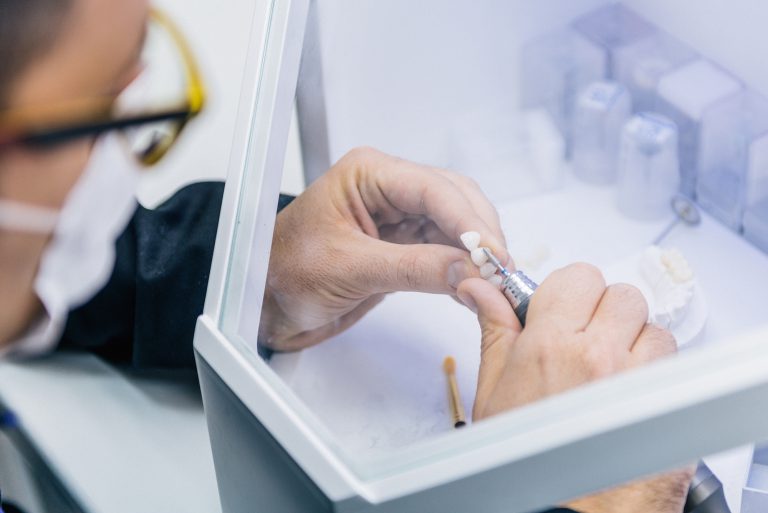
What Are Dental Implants?
A dental implant is a small metal screw designed to replace an entire tooth. During a minor surgical procedure, the dentist inserts the implant into the bone beneath your gums, precisely where the tooth is missing. The implant functions like a natural tooth root and is topped with a restoration, such as a dental crown, to ensure it looks and feels just like a real tooth.
Getting dental implants is a significant decision. If you’re considering an implant but are unsure what to expect, we’ve provided detailed information here to help you make an informed decision about your dental treatment.
Google Verified Patient Reviews
Why You Might Need Dental Implants
Your natural teeth support the height and shape of your smile, and they enable you to eat and speak comfortably. A gap in your smile can cause other teeth to drift out of alignment, increasing the risk of oral health problems. Losing even one tooth can trigger a chain of events that negatively impact your oral health, facial appearance, and overall quality of life.
Even if you don’t notice these effects, one problem is unavoidable: bone resorption. This natural process involves your body breaking down non-essential bone tissue to use the minerals elsewhere. Teeth in your jawbone stimulate the production of new bone tissue, but once teeth are lost, the bone tissue gradually dissolves. This leads to a shortened jaw and chin, causing wrinkles and giving your cheeks and lips a sunken appearance.
Dental implants are the next best thing to having natural teeth. By replacing lost teeth with implants, you can prevent or correct the issues mentioned above, maintaining both your oral health and facial aesthetics.


The Benefits of Dental Implants
Losing a tooth can be devastating, making us feel self-conscious about our smile and leading to various health problems. Missing teeth can cause an uncomfortable bite, difficulties eating, and may lead to bone loss or shifting teeth.
- Restore Your Natural Appearance: Dental implants look and feel like your own teeth. Custom-made to blend seamlessly with your smile, they are sized, shaped, and colored to match your unique bite and natural enamel color. As permanent replacements, implants restore your natural appearance and provide “perfect” teeth.
- Feel Confident in Your Comfort: When a dental implant is placed, your jawbone fuses with the titanium post during healing. This allows a crown or bridge to be permanently affixed to the post, or the implant can be used to secure implant-supported dentures. Regardless of the option, the dental implant remains stable. You can laugh, smile, and eat your favorite foods without worrying about shifting teeth or sudden pain.
- Improve Bone Strength: Losing teeth can cause the supporting bone to atrophy and weaken over time. Dental implants stimulate new bone growth around the implant, strengthening the bone structure.
- Long-Term Solution: Dental implants are a long-term solution that feels natural and can last for decades with proper oral hygiene.
Dental implants are a durable and long-lasting solution that feels natural and can last for decades with proper oral hygiene.


Dental Implant Restorations
A restoration is the “false tooth” that covers the implant. While the implant itself is not visible when you smile, the restoration makes it look like you have a new tooth.
- Dental Crown: This is the most common implant restoration, covering a single-tooth implant.
- Dental Bridge: A bridge spans the gap where multiple teeth in a row are missing. You can replace several teeth with just one or two implants that support a dental bridge. A full implant-supported bridge is an entire arch of upper or lower teeth fixed to four or more implants.
- Implant Denture: This option provides a removable denture with more stability by clipping it onto two small implants.


A New Life With Dental Implants Awaits!
Your smile won’t be the same after you get a dental implant; it’s going to be much better.
Dental implants are easy to maintain and care for. Simply brush and floss your implant daily and protect it from injury while playing sports Visit us periodically for checkups so we can ensure your implant remains healthy.
In return, your dental implant could reward you with many years of strong, happy, and beautiful smiles!
Start Today By Booking A Consultation
How It Feels
Although having a metal implant inserted into your jawbone might sound painful, the procedure is much more comfortable than you might expect. We use a mild anesthetic to numb your mouth, ensuring you don’t feel any pain during the surgery. Advanced dental technology allows us to place implants quickly, accurately, and conservatively, resulting in less discomfort and downtime during recovery.
Some implant patients report feeling bored or even sleepy during the brief half-hour procedure. The most uncomfortable part might be holding your mouth open for a few minutes at a time, but that’s all.
It’s normal to experience some swelling, discomfort, and even bruising in the hours following the procedure. However, the pain is mild and easily manageable. We provide specific instructions to help you minimize discomfort before the anesthetic wears off. Your surgical implant site should start feeling better within a week.
It might help to know that dental implants have a success rate of nearly 95%. Getting an implant is one of the safest and most predictable procedures in dentistry.


What to Expect on Your Dental Implant Treatment Journey
The actual implant placement process is much more comfortable than you might imagine.
Assessment
First, you’ll have a dental implant consultation to determine if implants are right for you. Your dentist will take X-rays and a 3D cone-beam CT scan of your jaw to evaluate the bone tissue and plan your treatment. The dental team will also take a scan or impression of your teeth to assist in planning the angulation of your implant.
Inserting the Implant
An anesthetic is administered to ensure the surgical site is completely numb. The dentist creates a small hole in the gums and bone of your mouth and places the implant post in the hole. Sometimes, sutures are needed to close up the gums, but not always.
Finalizing the Restoration
After the implant has healed over the next few months, you will return to the practice. At this point, your dental restoration will be ready. The restoration is placed on the implant, and you will leave with a brand-new, fully functional tooth.


Dr. Ali Al-Rubayee
Dentist
Your Dental Implants Dentist
Restoring and healing a person’s oral health and bringing out their biggest smile is Dr. Al-Rubayee’s passion. Dr. Al-Rubayee graduated with a bachelor’s degree in Dental Surgery in 2011 and is a proud member of The Royal College of Dental Surgeons of Ontario, The Ontario Dental Association and The Canadian Dental Association. His commitment to refining his skills and providing comfortable patient care is how he gives back to his own community. Every person who sits in Dr. Al-Rubayee’s chair is treated like family.
Contact us today
to schedule an initial consultation & exam.
Your consultation will include an examination of everything from your teeth, gums and soft tissues to the shape and condition of your bite. Generally, we want to see how your whole mouth looks and functions. Before we plan your treatment we want to know everything about the health and aesthetic of your smile, and, most importantly, what you want to achieve so we can help you get there.
Cost of Dental Implants
Dental implants are a significant investment and should be considered carefully, as the needs of each patient vary greatly. We prioritize your health and safety, providing only the highest quality care. So, how much do dental implants cost, and what are you paying for?
In Ontario, the cost for a single implant ranges from approximately $3,000 to $6,000+. Full-mouth reconstructive dental implants can cost between $10,000 and $60,000 or more. A full set of implant-supported dentures averages around $30,000. Keep in mind that no dental practice can provide an accurate quote over the phone due to the complexity and individual nature of the procedure.
- Type and number of implants needed
- Materials and supplies used
- Medical-grade equipment maintained for your benefit
- Time and experience of the dental team
- Location and complexity of the surgery
- Recovery time and post-surgery support
Factors Determining the Cost of Dental Implant Surgery:
Each case is unique, so it is essential to speak with a dentist and have an oral exam to evaluate your situation and consider different treatment options. We would be happy to provide you with a more accurate quote after this assessment.
Other Solutions for Missing Teeth
For gaps caused by 1 to 3 missing teeth, a dental bridge might be an option if adjacent teeth can support it. A significant number of missing teeth, or a completely edentulous mouth, may be addressed with dental prosthetics or removable dentures.
- When comparing the cost of dental implants to other tooth-replacement options, consider the pros and cons:
- Initial Investment: Dental implants may require a higher initial investment but are more secure and durable than bridges or dentures.
- Maintenance and Care: Removable dental prosthetics need different care and maintenance and might require adjustments or replacements as you age. In contrast, dental implants are cared for like natural teeth with routine oral hygiene and regular dental exams.
- Longevity: With proper care, a dental implant can last a lifetime, making it a cost-effective solution in the long term.
Frequently Asked Questions
Dental implants are small titanium posts surgically placed into the jawbone to replace the root of a missing tooth. Once integrated with the bone, they provide a stable foundation for a crown, bridge, or denture.
Good candidates for dental implants are individuals with healthy gums, sufficient jawbone density, and overall good health. A thorough evaluation by a dentist or oral surgeon is necessary to determine suitability.
The dental implant process typically takes several months. After the initial implant placement, a healing period of 3 to 6 months is needed for the implant to fuse with the bone. Following this, a custom crown or other restoration is placed.
The implant procedure itself is performed under local anesthesia, so there is minimal discomfort during the surgery. Post-operative discomfort is usually mild and can be managed with over-the-counter pain medications.
Caring for dental implants is similar to caring for natural teeth. Brush and floss daily, and visit your dentist regularly for check-ups and cleanings to ensure the health of the implant and surrounding tissues.
Dental implants have a success rate of approximately 95%. Factors such as proper care, overall health, and avoiding smoking can contribute to the longevity and success of the implants.
While rare, dental implants can fail due to infection, insufficient bone integration, or excessive stress on the implant. Regular dental visits and good oral hygiene practices are crucial in preventing implant failure.
With proper care and maintenance, dental implants can last a lifetime. Regular dental visits, good oral hygiene, and avoiding harmful habits like smoking contribute to the longevity of implants.
Dental implant coverage varies by insurance plan. Some plans may cover part of the procedure, such as the crown or abutment, while others may not cover implants at all. It’s important to check with your insurance provider to understand your coverage.
Dental implants offer several benefits over other tooth replacement options. They provide a permanent and stable solution that looks and feels like natural teeth. Implants help maintain jawbone health, prevent adjacent teeth from shifting, and do not require altering nearby teeth like traditional bridges. Additionally, they offer better chewing efficiency and comfort compared to removable dentures.









